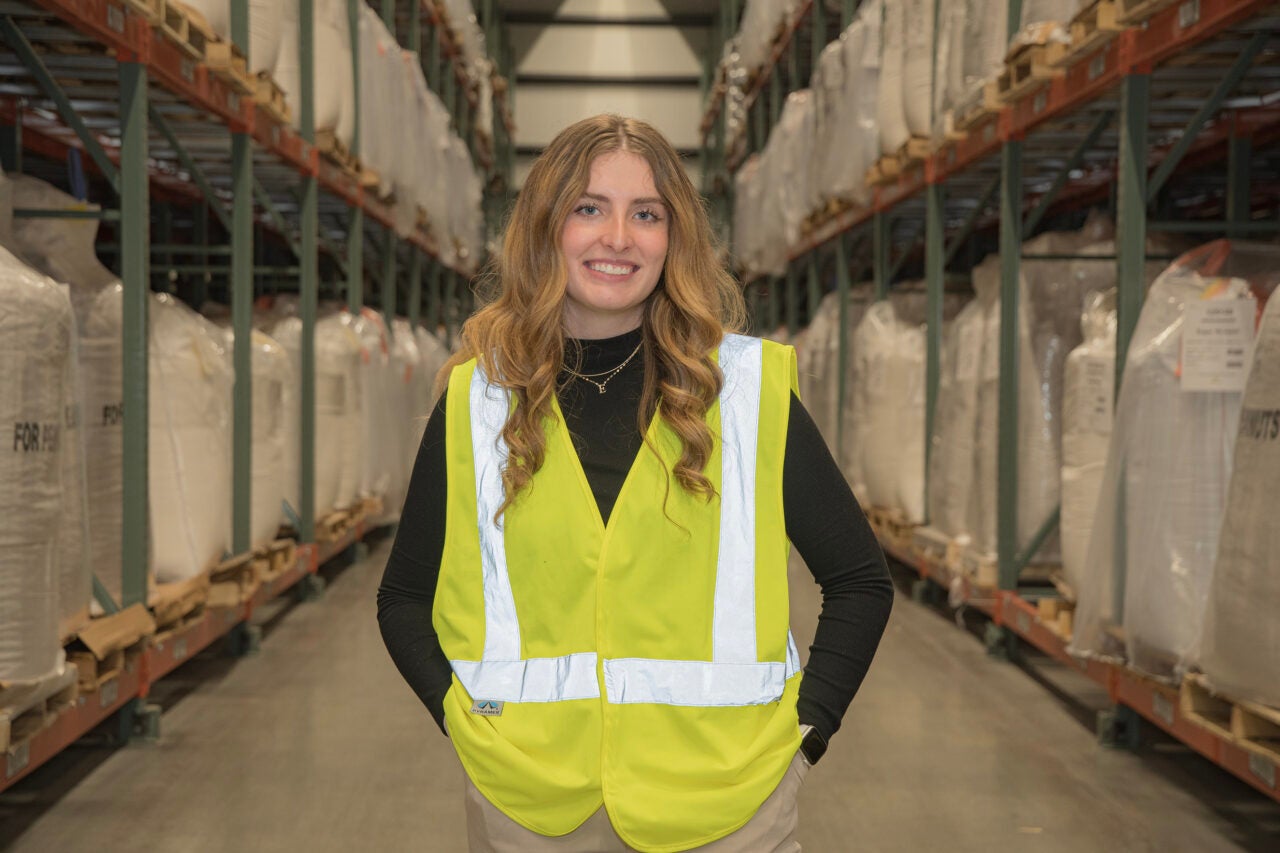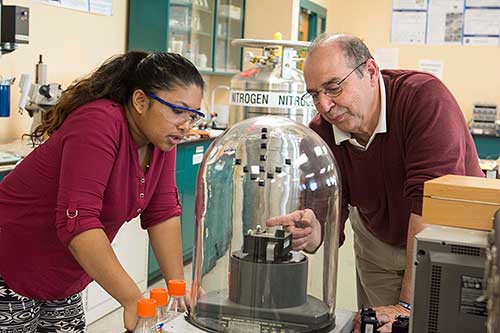
Industrial engineer Emily Fischer ’20, MBA ’21 at the Edesia warehouse
Emily Fischer, B.S. ’20, M.B.A. ’21, listened intently to the human resources representative’s presentation on Edesia, a Rhode Island-based food manufacturer working to end global malnutrition.
At the time, Fischer was an M.B.A. student in an organizational behavior class at URI. Working for a social enterprise was something Fischer was interested in, but, in her experience, engineers didn’t often find mission-driven, social enterprise-type work. After graduation, when Fischer saw Edesia was advertising for an industrial engineer, she applied. And she got the job.
Edesia produces a line of vitamin and mineral-fortified, ready-to-eat nut butter products, but it is Plumpy’Nut, a peanut-based product, that put the Rhode Island company on the global radar. Plumpy’Nut is used in cases of extreme malnutrition. Each individually wrapped 92g serving, called a sachet, contains 500 calories. Plumpy’Nut has the consistency of natural peanut butter and tastes sweet, like the filling in a Reese’s Peanut Butter Cup. Plumpy’Nut and other Edesia products are destined for clinics that distribute them to their patients and the mothers of children who visit the clinics. The company also offers supplemental and preventative products for children with less severe cases of malnutrition and for lactating and pregnant mothers and school-aged children.
Edesia has ongoing relationships with global partners such as the World Food Program, UNICEF, and USAID. In 2021, Edesia products reached 2.5 million children in 33 countries, according to its annual report.
Fischer’s job is to research and purchase equipment as well as assess processing to optimize the production of Edesia products. Output is of paramount concern when a company’s mission is to end starvation and severe malnutrition worldwide.
‘We cannot produce fast enough’
An estimated 20 million children worldwide are malnourished. A child dies of malnourishment every six seconds. Demand for Edesia’s products is so great that the company has implemented a 24/7 production schedule, which required some reconfiguring of space in the physical plant as well as the purchase of new equipment and the hiring of 30 new employees, an increase to the workforce of about 30%.
Fischer, one of the company’s two on-site engineers, has had a busy year. “We really cannot produce fast enough here,” she said.
The company’s reception area offers a view of the production line. Aside the couch and chairs there are baskets filled with Edesia products. Each product in Edesia’s line is color-coded, and for each there is a corresponding armband—mid-upper arm circumference tape, MUAC—that determines the severity of malnutrition in a child, Fischer said. “It’s a simple and effective way for onsite healthcare workers and volunteers to determine malnourishment levels and prescribe treatment to the children,” she added.
Plumpy’Nut is the “worst-case scenario,” product, Fischer said. Plumpy’Nut is given when malnutrition is so severe that the child eats nothing but that, three sachets a day, for 30 days, 1,500 calories daily. In a 2012 60 Minutes interview with Anderson Cooper, Tecton Otis, chief nutritionist for the international nonprofit Doctors Without Borders, equated Plumpy’Nut to an essential medicine. “In three weeks, we can cure a kid that is looking half-dead,” Otis said. “We can cure them like an antibiotic. It’s a spectacular response.”
Edesia’s products have a shelf life of two years and don’t need refrigeration, which is essential because it can take a shipment six months to arrive in the remotest areas on the planet. “We even say products travel sometimes on a donkey’s back because often there are reasons that the product can’t be shipped directly to the people who need it,” Fischer said. “Sometimes its transported by hand and by foot.”
‘Hunger is solvable’
Fischer mentions her grandmother, who at age 84 volunteers weekly at a hospice center, making meals and tending to residents’ needs. Her gradmother’s example has made a lasting impression. “My grandmother has always given back, always been a community person,” Fischer said. “I’ve kind of always had that in the back of my mind.
“I really enjoy what I’m doing right now—especially the expansion,” Fischer said. “Everyone wants to do well here because we know what happens when we do well: We get this product out the door; we feed more kids.
“Hunger is solvable.”
—Marybeth Reilly-McGreen

